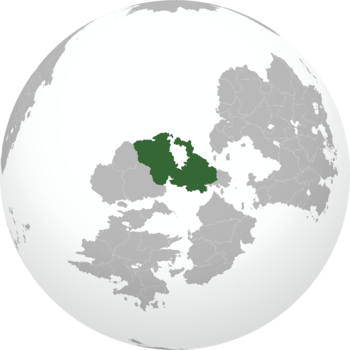Mectanyika
Mectanyika, officially the Democratic Republic of Mectanyika, is a sovereign state located in north-central Audonia. It is bordered to the north by the Fulani Sea, to the east by the Bulkh People's Republic, to the south by the Bay of Kandahar, to the southwest by ??? and to the west by ????. The country is a loosely-bound confederation of smaller states, varying wildly in size and ethnic makeup.
Democratic Republic of Mectanyika Oʒue za Mektanyika | |
|---|---|
|
Flag | |
Motto: Lǒktos Ingenuity | |
 | |
| Location | Mectanyika in northern Audonia |
| Capital and largest city | Amenhotep |
| Official languages | Swahili, Hausa, Oyo, Igbo, Jǒwetic, Malic, Arabic, Bozarkis |
| Ethnic groups |
|
| Demonym(s) | Mectanikyan |
| Government | Asymmetric federal republic |
| Kondo Adeyemi | |
| Legislature | Parliament of Mectanyika |
| Ibis's Chamber | |
| House of Representatives | |
| Population | |
• Estimate | 396,902,000 |
• Census | 392,815,070 |
| GDP (nominal) | estimate |
• Total | $9,254,723,050,000 |
• Per capita | $23,560/c |
| Currency | Loti (MKL) |
| Driving side | right |
| Calling code | +69 |
| Internet TLD | .mk |
The Mectanyikan climate varies dramatically, with arid mountains along the northern coast slowly transitioning to rugged steppes and the expansive grasslands that give Mectanyika its name. Along the southern coast, monsoons drive the formation of coastal savannahs, where trees grow increasingly dense until they reach the equator directly, where they form the Agako, a rainforest nearly the size of Etzil and extending into neighbouring Bulkh. The coast along the Bozark Gulf possesses a Mediterranean climate, and is home to some of the oldest cities on the continent.
Humans first settled in Mectanyikan land in Ugwundụdụ in ~9100 BC. By ~2910 BC, the first organized civilization in the region arose along the Iteru River in what is now the state of Ayatapyr, near the Bulkhan border. The Ghana empire populated the region around Lake Ghana around 1200 BC, where they established the oldest known continuously-inhabited city in the country, O̊mua. The Bozark developed next, in 712 BC, originating in today's Peshabiwar and colonizing much of the country's northern coastlines. In approximately 1402, the Songhai and Mali empires rose roughly concurrently, becoming the dominant seats of power in the western part of the country for the next half-millennium. The nomadic Makh'taȵ were the next to arise, briefly uniting the eastern part of the country from the [name] River to the Bulkhan border.
wip